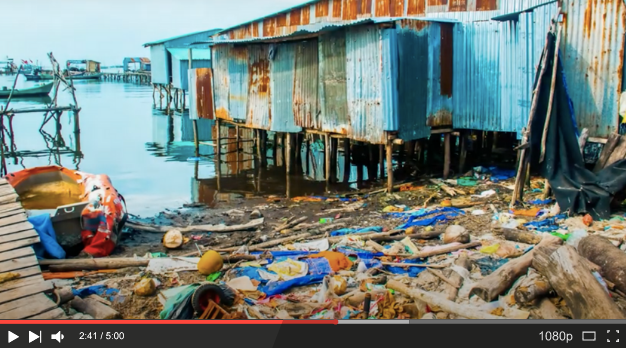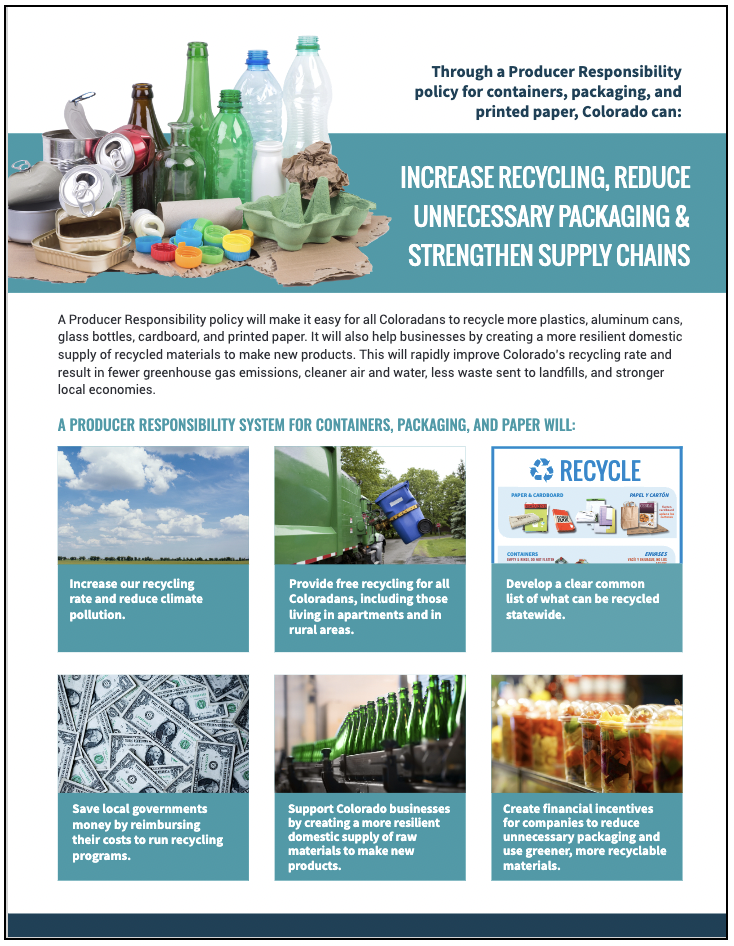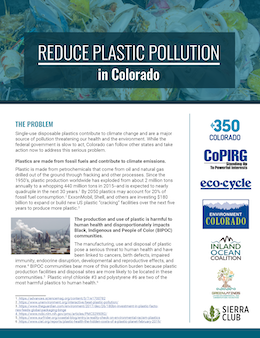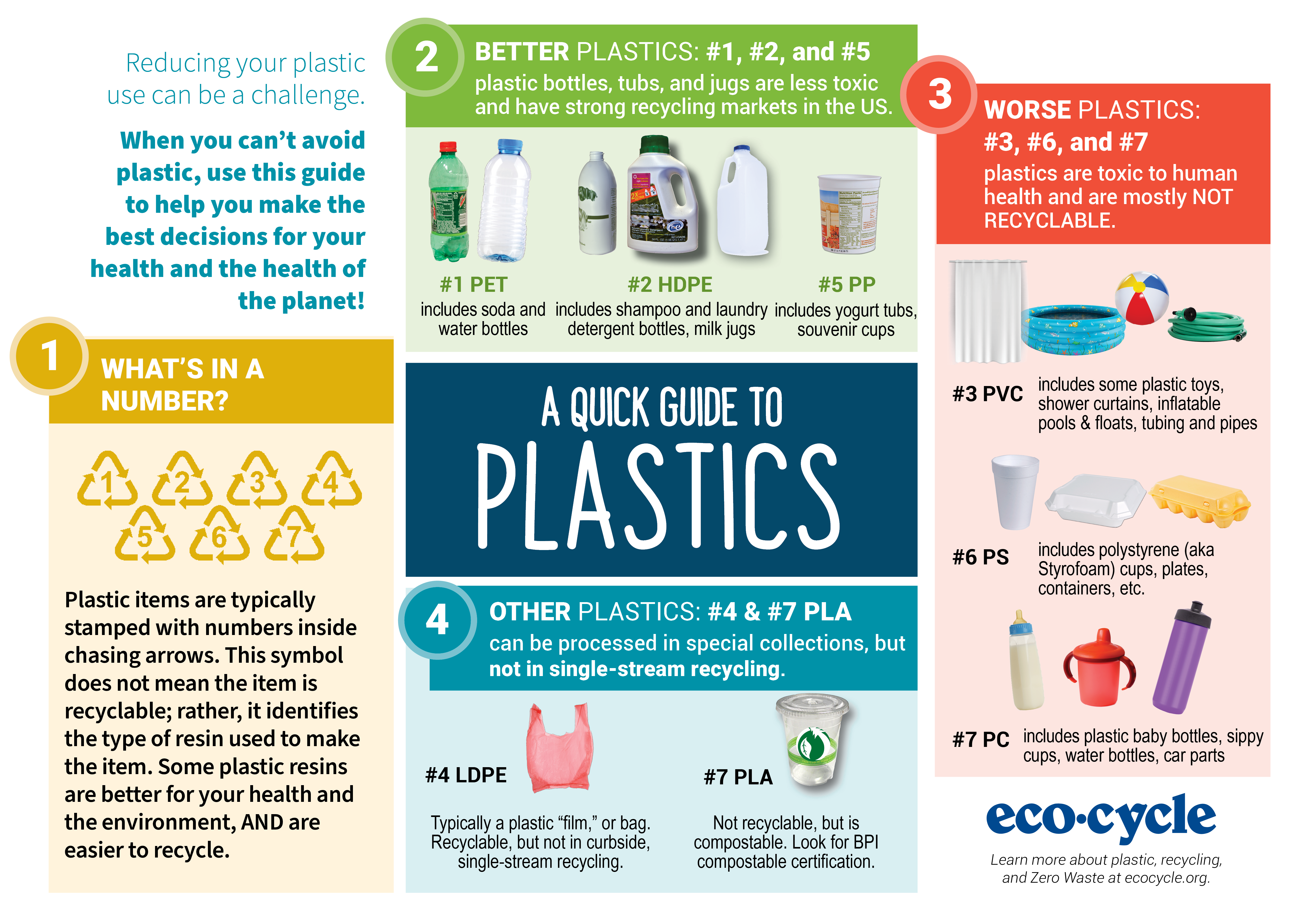Reducing Plastic Pollution Requires Changing the System That Created It
One of Eco-Cycle’s primary areas of work is reducing plastic pollution. While we each can educate ourselves and take steps in our personal lives to reduce our consumption of plastic by skipping the use of straws, bringing our own bag to the grocery store, bringing our own to-go container to the restaurant, etc., the tool to enact real change is policy so that we are changing the system itself, not just the behavior of a relative few. Numerous countries, states, and cities are starting to understand that we are in a plastic pollution crisis, and that our addiction to single-use plastics made from fossil fuels is a significant contributor to climate change. We are seeing an unprecedented urgency toward passing legislation that reduces the use of unnecessary disposable plastics, and puts the onus on producers to redesign their products to use less plastic and to buy their own products back for remanufacturing to create real recycling solutions. Eco-Cycle is heavily engaged in helping Colorado communities and the state pass such legislation. We will succeed with your help! Learn about our policy work below and how you can help!
State-Level Policy
Colorado currently has one of the lowest recycling rates in the nation—16%, which is less than half the national average of 32%. The good news is that the plastics crisis as well as this abysmal recycling rate is spurring unprecedented legislative action to reduce plastic and capture more plastic and other materials for recycling. Get the latest updates sent directly to your email and take action as needed to help pass these historic and much-needed measures.
State Zero Waste Legislation Recently Passed
PASSED: HB22-1355, Producer Responsibility Program For Recycling was passed into law in June of 2022. Sponsored by Representative Lisa Cutter, Senator Kevin Priola, and Senator Julie Gonzales, this innovative bill will help improve recycling throughout the state, reduce unnecessary packaging, and build more resilient domestic supply chains through a Producer Responsibility policy for containers, packaging, and paper. The introduction and passage of this bill is the culmination of efforts by Eco-Cycle, legislators, and partners to develop a policy that makes it easy for all Coloradans to recycle more plastic, aluminum, glass, cardboard, and printed paper. The bill requires large producers of packaging to help fund local recycling programs, which will support needed recycling infrastructure and services throughout the state, and also incentivize producers to create more sustainable packaging. Learn more about this campaign at recyclingforallcoloradans.org.
PASSED: HB22-1159, Waste Diversion And Circular Economy Development Center. Colorado’s recycling rate is well below the national average. One of the barriers to recycling in Colorado is our lack of recycling “end markets”—businesses that use recycled materials to make new products. Eco-Cycle advocated for the passage of House Bill 22-1159, sponsored by Representative Lisa Cutter and Senator Kevin Priola, which will create a Circular Economy Development Center with the primary goal of attracting and supporting recycling end-market businesses. The Center will divert valuable resources from being landfilled, create local jobs, provide essential materials for manufacturing, and reduce transportation emissions and costs—especially important in a time of increasing global gas prices.
PASSED: HB21-1162, Prohibit Food Establishments’ Use Of Polystyrene, aka the Plastic Pollution Reduction Act. In 2021, in a tremendous and unprecedented victory, Colorado Gov. Jared Polis signed the landmark Plastic Pollution Reduction Act into law, which will phase out single-use plastic bags, polystyrene cups, and polystyrene containers in the state, and reverse a law that prohibits municipalities from passing their own ordinances to address plastic waste. Colorado became the first state in the nation to strike down its state preemption law, restoring the right of local municipalities to enact their own plastic regulations.
PASSED: SB20-055, Incentivize Development Recycling End Markets. In July 2020, the state legislature passed SB 20-055, Incentivize Development Recycling End Markets. This bill is intended to grow recycling programs by addressing the lack of local end markets for recyclable materials in Colorado. The bill includes four main components: a recycling market development center, a Producer Responsibility literature overview, business personal property tax reimbursements, and a statewide education campaign on recycling.
PASSED: SB19-192, Front Range Waste Diversion Enterprise Grant Program. The Front Range Waste Diversion (FRWD—pronounced “Forward”) program and enterprise fund was approved by the Colorado state legislature in 2019 and collects funds from an increase in user fees at Front Range landfills to provide grants and technical assistance to Front Range communities to increase recycling, composting, and waste reduction. The funding will provide an estimated $100 million over 10 years.
Proposed (but Failed) State Zero Waste Legislation
LOST: HB22-1134, Measures To Reduce Use of Single-use Meal Accessories, aka “Skip the Stuff” bill. Similar to Denver’s successful “Skip the Stuff” bill, the intention of this bill was to change the expectation of automatically receiving unnecessary service ware items, which would save restaurants money and reduce waste.
City-Level Policy
Denver
- PASSED: Expanded Waste Services Program. Denver residents and community advocates wanting more access to recycling and composting services for all residents worked together on a six-year campaign calling upon the Denver City Council to enact an Expanded Waste Services Program. The policy passed in June of 2022 and will provide weekly recycling and composting services at no additional cost to residents and incentivize less waste going to the landfill through volume-based pricing for trash. The new Expanded Waste Services program will allow residents to choose from a 35-gallon trash bin for $9/month, a 65-gallon bin for $13/month, or a 95-gallon bin for $21/month. The fees collected will be used to provide weekly recycling and composting pickup at no additional cost. Importantly, the new program will include a first-in-the-country instant rebate program to help low-income households pay for trash services. Denver currently saves over 121,000 MTCO2e in carbon pollution annually through recycling and composting. The Expanded Waste Services Program will put Denver on the path to catching up with peer cities like Seattle and tripling its recycling rate. Recovering 75% of Denver’s waste through the new services can reduce up to 369,000 MTCO2e per year, the equivalent of taking over 80,000 cars off the road each year.
- PASSED: Denver’s Single-Use Accessory Restriction Ordinance, or the “Skip the Stuff” bill, went into effect in January 2022. This ordinance requires all retail food establishments to provide single-use condiments and single-use service ware upon request only by a customer with the goal of drastically reducing the amount of condiments, plastic silverware, and straws restaurants need to buy and making Denver a leader in the sustainability space.
- PASSED: Fee on Disposable Bags. To reduce the number of disposable carryout bags used, littered, and landfilled, Denver introduced a fee on disposable bags starting on July 1, 2021. The program encourages shoppers to switch to reusable bags and requires retail stores in Denver to charge 10 cents for each disposable bag (plastic, paper, or other material including but not limited to compostable material) provided to customers at checkout.
Boulder
- PASSED: City of Boulder Universal Zero Waste Ordinance. In 2015, Boulder City Council adopted the Universal Zero Waste Ordinance (UZWO), which requires all properties, businesses, and waste haulers to provide composting, recycling, and landfill collection services to tenants, residents, customers, and employees. The ordinance also requires business owners to separate recyclables and compostables from trash, place bins for each waste stream, post signs on or above all waste bins, and train employees on proper sorting.
- PASSED: City of Boulder Disposable Bag Fee. In November 2012, City Council adopted a Disposable Bag Fee Ordinance requiring a 10-cent fee for disposable plastic and paper checkout bags at all grocery stores in Boulder. The bag fee does not apply to restaurants, bulk or produce bags, newspaper bags, or any other kind of food packaging bags. At the time of adoption, Boulder used approximately 33 million checkout bags a year, or about 342 bags per person each year. Boulder saw a 70% decrease in plastic bag use immediately following the implementation of the bag fee, however, that trend leveled off quickly. As of early 2018, the fee had collected approximately $1,000,000 since it went into effect in 2013.
Fort Collins
- PASSED: Fort Collins Bag Ordinance. In April of 2021, Eco-Cycle worked with the City and County of Fort Collins to pass a landmark plastic bag ordinance to fight plastic pollution. Fort Collins voters elected to join 16 other Colorado communities (with the City of Boulder among them) and 450 US cities in regulating plastic disposable carry-out bags. On April 6, Fort Collins voters overwhelmingly passed Ordinance 26—a phase-out of single-use plastic bags at large grocery stores beginning May 22, 2022. The measure is expected to reduce plastic bag litter in the city.
Arvada
- PASSED: Arvada Residential Waste and Recycling Program. In 2020, Arvada City Council voted to make Arvada the largest city in Colorado to contract for recycling services, resulting in a significant step forward for increasing recycling, reducing greenhouse gas emissions, and reducing air and noise pollution from trash trucks.
Louisville
- PASSED: Disposable Bag Tax. In 2020, Louisville voters approved Ballot Question 2A, which aims to reduce single-use bag consumption within the community by applying a 25-cent tax on every paper and plastic bag provided to the customer by a Louisville retailer. Effective January 1, 2022, all stores in Louisville are required to charge 25 cents for every plastic or paper bag used at checkout.



























